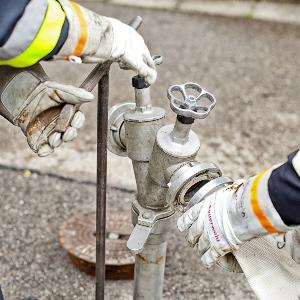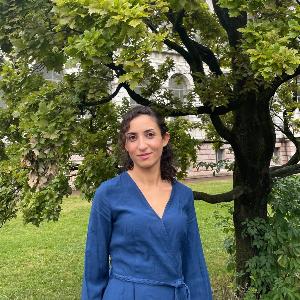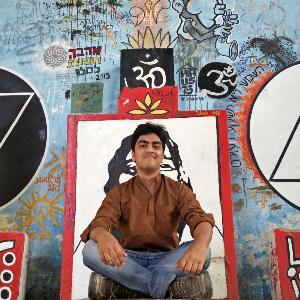Firefighting with data science
11 Sept 2023
Two international teams of students have two months to apply their data science know-how to benefit society. One of the projects involves helping the Bavarian fire service.
11 Sept 2023
Two international teams of students have two months to apply their data science know-how to benefit society. One of the projects involves helping the Bavarian fire service.

With a new app, Bavarian fire departments are to be given a better overview of their available hydrants in the future. | © IMAGO / Westend61
Although the world is teeming with all kinds of data, it is not always so easy to understand and extract practical utility from this abundance. We know, however, that enormous potential for science, the economy, and social causes can lie buried within such data. For instance, it can close gaps in our knowledge about soil sealing in Germany, advancing environmental and climate goals; or it can improve the logistics of emergency services when it comes to tackling fires. These examples are not chosen at random, as it is precisely these cases that the two teams from DSSGx Munich are addressing.
The Data Science for Social Good (DSSG) Fellowship Program seeks to exploit the potential of data science to make the world a better place. Non-profit organizations can apply with concrete problems for the solution of which they lack the time, financial resources, or requisite know-how. DSSG brings together students and young professionals with different expertise and backgrounds to find specific solutions to these problems. The idea originates in the United States, and LMU is hosting the program this year for the first time. “We’re delighted to be able to launch our own version of the DSSG Fellowship Program here in Munich thanks to the collaboration between the Department of Statistics and the Munich Center for Machine Learning (MCML),” says Professor Frauke Kreuter, Chair for Statistics and Data Science in Social Sciences and the Humanities at LMU, who organized and heads up DSSGx Munich together with Professor Bernd Bischl, Co-Director of MCML.
Applications are being found for data science today in a host of different areas. And naturally data science can also be used for social causes in numerous ways.Rahaf Gharz Addien
From the start of August to the end of September, young experts from all over the world are being hosted in Munich, where they are cooperating on projects to deliver social good. Each project has a dedicated team of four to five participants. “With DSSGx Munich, we’re bringing together interdisciplinary teams with different skill profiles and backgrounds,” explains Bischl. “Students work on solving problems with social impact under the academic supervision of MCML.” Scientific advancement, economic benefit, and the use of new machine learning technologies for social good are the order of the day. “We’re already very excited to see what results the teams bring back.”

„Our team has members from a wide variety of professional backgrounds. This provides a very fruitful mix of skills and viewpoints.“ | © Rahaf Gharz Addien
“Applications are being found for data science today in a host of different areas. And naturally data science can also be used for social causes in numerous ways,” says Rahaf Gharz Addien, who studied mathematics in Syria and completed her master’s degree at Freie Universität Berlin one year ago. She is currently working at the German Centre for Integration and Migration Research (DeZIM). “Many organizations have loads of data, but often lack the expert knowledge required to analyze it and derive useful information from it,” adds her team colleague Pankaj Singla, who studied electrical engineering in India and completed his master’s degree in psychology, statistics, and machine learning at KU Leuven in Belgium just a few weeks ago.
In their DSSGx project, the two are working on a subject that involves close collaboration with the Munich fire service. “We’re trying to develop a user-friendly app for the fire departments in Munich and Bavaria,” explains Rahaf. The main goal of the project is to facilitate better planning for the use and placement of fire hydrants. Pankaj lays out the principle as follows: “Let’s suppose that a fire breaks out in the center of Munich and the fire service wants to know whether a hydrant located two kilometers away has enough range. That is to say, if they park a fire engine there, would its hose reach the source and be able to effectively put out the fire?” With the planned app, such questions could be answered for any place in Bavaria at the push of a button. In addition, the app would be able to point out gaps in the system – areas in Munich or Bavaria that are not covered by existing hydrants. “And so our project ultimately helps ensure that every point and every area can be reached by a hydrant or another water source,” summarizes Rahaf. With the new possibilities offered by technology and data science in particular, this problem can now be addressed much more effectively than even a few years ago.
In such a diverse group, you can learn lots of new things and perhaps develop new ideas that wouldn’t have occurred to a pure software developer.Pankaj Singla

„Here we have the privilege of knowing that our collective efforts have had a tangible positive effect on the work of the firefighters.“ | © Pankaj Singla
Rahaf and Pankaj had no previous experience with firefighting or hydrants. When they applied for the DSSG program, they still had no idea which project they would end up being assigned – hydrants in Bavaria or climate-oriented land use planning in Germany? But precisely this newness to the topic gave them fresh perspectives. “Our team has members from a wide variety of professional backgrounds,” says Rahaf. “This provides a very fruitful mix of skills and viewpoints. While we’re working on the project, we’re learning together and from each other.”
All team members work on site in Munich for the duration of the program and even live together. LMU provides them with offices and seminar rooms for their project. This makes the collaboration a very intensive experience for the participants, and they have lots of time to get to know each other and build relationships. “I really enjoy this aspect,” says Pankaj. “In such a diverse group, you can learn lots of new things and perhaps develop new ideas that wouldn’t have occurred to a pure software developer.”
Here we can concentrate fully on doing social good. This gives us a real sense of how we can apply our professional knowledge to the benefit of society and change things to make the world a better place.Rahaf Gharz Addien
Despite their different areas of expertise and experience, the team is united by the motivation to do something to make society better. “Most of us have the opportunity to work in industry and earn really a lot of money, no matter what the goals or topics of our work are,” says Rahaf. “But here we can concentrate fully on doing social good. This gives us a real sense of how we can apply our professional knowledge to the benefit of society and change things to make the world a better place.” In contrast to working in industry or academia, the project brings the teams much closer to everyday practice,” adds Pankaj. “Here we have the privilege of knowing with certainty when the project ends that our collective efforts have had a tangible positive effect on the work of the firefighters with whom we’re collaborating.” The satisfaction this knowledge brings is a strong motivating force for the team.
Although the fire service is very busy of course, they made a lot of time for us, gave us a useful grounding in the subject-matter, and answered all our annoying questions.Pankaj Singla
Moreover, the collaboration and exchange between the fellows and the Munich fire service is a very enriching experience for all parties. At the start of the project, the DSSG team visited the fire department to gain an overview of the working practices of the firefighters and the problems they face. “Although the fire service is very busy of course, they made a lot of time for us, gave us a useful grounding in the subject-matter, and answered all our annoying questions,” recalls Pankaj. Since then, both sides have been in regular contact with each other.
The DSSGx participants have already presented an initial raw version of the planned app and are confident of finalizing it in regular feedback sessions with their project partners by the deadline at the end of September. If successful, it will be possible to feed the app with any kind of data about available hydrants and use it throughout Bavaria. Incidentally, there is no technical reason why the application must be limited to Bavaria only. “It would be very easy to adapt it for other regions. The way we program the app, we’ve kept it very general, so theoretically it can be used anywhere,” says Rahaf.
Concurrently, the other DSSGx Munich team is using web scraping and NLP methodologies to build a comprehensive dataset about land-use planning, by combing data sources from local and regional levels in the state of NRW. Such a dataset can then help obtain a more detailed understanding of environmental impacts and be able to gauge the climate resilience of various regions more accurately.